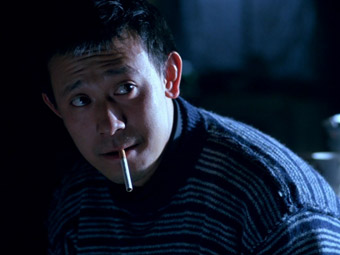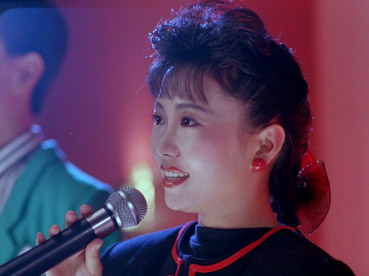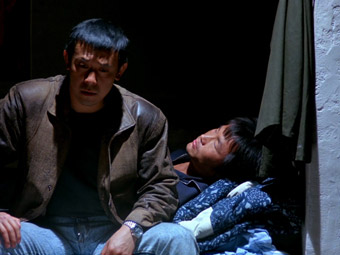|
There's something hypnotic about follow shots, ones in which the camera pursues and keeps in step with a character like faithful companion, accompanying them with uncertain purpose to an often unspecified destination. A good follow shot will connect us to a character we may not already know through the journey they are undertaking, and build a sense of anticipation about what or whom we are being taken to see.
Xie Fei's 1990 film Black Snow [Ben ming nian] opens with just such a shot, a symbolic walk from underground darkness into the light of everyday life for a character whose identity is yet to be established. Who he is, where he's been and where he is going become clear over the next few minutes, revealed in almost incidental manner through conversational snippets that are left to us to compile into a personal profile, much as any other newcomer to the district and its people would be required to do. Over the course of his subsequent encounters and personal recollections, we learn that the man's name is Liu Huiquan and that he's just returned from a three-year stretch in prison for assisting his friend Chazi in a pointless revenge assault that led to a young man's death.

There's a seductive elegance to this slow reveal that provides jigsaw pieces of Liu's back story and allows us to meet and connect with the man before we have the chance to pre-judge him on his past actions. This also enables director Xie Fei to tell the story almost exclusively from Lui's perspective, and us to experience his sense of societal displacement on an emotional and even empathic level. It's all in the detail, in the small frustrations and pleasures of everyday existence, in the way that what we are sometimes forced to settle for often falls short of our hopes or expectations, and how the simplest things can unexpectedly bring light to the prevailing gloom.
The early signs are that things may work out for Liu and that he might just be able to put his past behind him, thanks in part to his brusquely non-judgemental Auntie Lou, who has kept a watchful eye on his run-down back street home and secures him a trader's licence so that he might legally operate a market stall. Fate also deals him a promising hand when he's asked by a local bar owner to escort pretty young singer Zhao home one night and the two strike up a friendship that soon shows signs of developing into something more. He's even on reasonable terms with the policeman he is required to report to, a family friend who appears genuinely concerned for Liu's future welfare.
But as Liu soon learns, not all chance encounters are beneficial and not everyone is as understanding and altruistic as Auntie Lou. An old acquaintance named Ma Dawang invites him for drink and is soon borrowing money he has no intention of repaying, and a bar room encounter with black market dealer Cui Yongli leads to him peddling counterfeit goods, despite a friendly warning from the police about the company he's starting to keep. His attempt at kindness towards Chazi's mother is thrown curtly back in his face, while his developing feelings for Zhao take a knock when she achieves the success she's been looking for and refocuses her attention on her fashionably dressed and good-looking new singing partner.

There is, it has to be said, an air of pre-destiny that hangs over Liu from an early stage and risks casting him as an archetype, the former criminal who wants to go straight but who falls victim to the judgement and bad influence of others, one who finds a possible route to redemption and stability in the company of a woman who knows nothing of his history and appears to accept him for who he is. Which is exactly how it plays out, of course, at least in the broadest sense. But director Xie Fei approaches the story as if telling it for the very first time, stripping it of its high drama and transforming it into a layered study of a man who has become trapped in society's shadow.
A good deal of the film's hold comes from the refreshing restraint with which the story is told and performed. Every element is underplayed and the narrative is developed with precision-tooled economy, from the isolated photograph that silently speaks of the impact of the death of Liu's mother's to the early progression of Liu and Zhao's friendship, captured by the repetition of an identically framed night-time alleyway walk that by its third appearance sees Zhao moved up from pedestrian to passenger on Lui's bicycle. Open conflict and sudden twists are kept to a minimum, with the result that Lui's confidence and fortune undergo a process of slow decay rather than dramatic collapse, every turn of which Jiang Wen's beautifully understated central performance sells as real. It's in his moments of solitude that Wen really shines, as he contemplates his life, smokes his first post-prison cigarette, or hides in his room from visitors he is not yet ready to face. In an exquisitely handled example of the film's less-is-more ethos, his apparent surface cool is shattered by the single tear that escapes from beneath his sunglasses, a moment whose emotionally power comes largely from its sense of understatement.
There is, of course, more going on here than just personal drama, with the timing and locale openly inviting a socio-political reading, one that sees the film as a document and critique of Chinese sub-culture on the brink of the 1989 student uprising, which culminated in the Tiananmen Square massacre in June of that year. There is certainly some fascination in the background texturing, from the encroaching influence of western fashion and celebrity culture to the black market goods and pirated western movies that Cui ropes Liu into selling and transporting. Just how layered and provocative this texturing and commentary seems will depend in part on the depth of your understanding of late 80s Chinese society and its attitudes to film censorship, a problem faced by any culturally relevant film viewed outside of its domestic market and temporally displaced from the events its portrays.*

But while your appreciation of Black Snow will definitely be enhanced by a little local knowledge, it in no way relies on it, and for the uninitiated these elements will still serve as intriguing (and hopefully enlightening) background detail to a confidently handled and consistently absorbing drama. Gorgeously shot by Feng Xiao – whose rich use of natural light and colour could almost have served as a template for Phil Agland's visually striking 1994 documentary series China: Beyond the Clouds – Black Snow is a finely tooled hymn to the pleasures of cinematic restraint and minimalist drama, one in which almost every shot, every look and every carefully chosen and dressed location tells its own small story, and which collectively make what on the surface may seem like a structurally and even thematically familiar tale feel as fresh as the day it was first told.
It all depends on the quality of your TV and the upscaling abilities of your disc player, of course, but every now and then a DVD transfer appears that prompts me to seriously question those claims that Blu-ray offers five times the picture quality of DVD. This is one such disc. The image quality is consistently excellent, it's sharpness and rich (but never over-saturated) colours beautifully showcasing Feng Xiao's lovely 1.37:1 cinematography. The pitch-perfect contrast of daylight exteriors is slightly stronger on many interior scenes, particularly at night, but this is more to do with Xiao's high key lighting than any transfer issues.
The mono 2.0 soundtrack is not quite as sparkling, having a surprisingly narrow dynamic range and a slightly muffled feel, but there is no background hiss or damage and no major issues with dialogue clarity for Chinese-speaking viewers.
One small thing worth noting is that if you're watching the film on a plasma or LCD TV with the overscan off, a small white line appears at the very bottom of screen in time with the (optional) subtitles.
Interview with Xie Fei (31:50)
The film's genial and gently spoken director Xie Fei, now professor at the Beijing Film Academy (where he was once a student), takes us on a journey through his film career, with copies of the Chinese DVDs of his films at hand to use as props. Topics covered include his early work, the difference between entertainment and cultural art films, the importance of film festivals, the globalisation of the industry, and the liberating effect of digital technology. He even finds a small up-side to the otherwise "calamitous" Cultural Revolution. A very engaging and informative extra.
Also included in the package is a Booklet containing a useful essay on the cinema of Xie Fei by Shaoyi Sun, Professor of Film and Media Studies at Shanghai University's School of Film & TV Art and Technology.
It's taken a while for me to get round to this review, in part because I found it so hard to put my finger on exactly why Black Snow exerts the hold it does. Its familiar set-up and low-key approach should on paper make it a bit of a slog, but it grabs from that compelling opening shot and consistently grips with its fat-free storytelling and attention to character and background detail. A terrific transfer and two worthwhile extras make this another winner for Second Run, particularly at the very reasonable asking price. Recommended.
About five years ago I was asked to work with a group of media students, all in their late teens, on the storytelling potential of the photographic image. One project required them to construct a narrative from three press photos taken before, during and after a major incident. Due to its notoriety, I used photographs of the Tiananmen Square protests and subsequent military action as a warm-up exercise, but quickly hit an unexpected snag – not one of the students had even heard of this major historical event, and what began as an introductory exercise was turned into a history lesson. How quickly the world forgets.
|